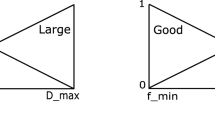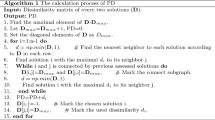Abstract
In recent years, Multi-Objective Evolutionary Algorithms (moeas) that consider diversity as an objective have been used to tackle single-objective optimisation problems. The ability to deal with premature convergence has been greatly improved with these schemes. However, they usually increase the number of free parameters that need to be tuned. To improve results and avoid the tedious hand-tuning of algorithms, the use of automated parameter control approaches that are able to adapt parameter values during the course of an evolutionary run are becoming more common in the field of Evolutionary Computation (ec). This research focuses on the application of parameter control approaches to diversity-based moeas. Two external parameter control methods are investigated; a novel method based on Fuzzy Logic and a recently proposed Hyper-heuristic. These are compared to an internal control method that uses self-adaptation. An extensive comparison of the three methods is carried out using a set of single-objective benchmark problems of diverse complexity. Analyses include comparisons to a wide range of schemes with fixed parameters and to a single-objective approach. The results show that the fuzzy logic and hyper-heuristic methods are able to find similar or better solutions than the fixed parameter methods for a significant number of problems, with considerable savings in computational resources and time, whereas the self-adaptive strategy provides little benefit. Finally, we also demonstrate that the controlled diversity-based moea outperforms the single-objective scheme in most cases, thus showing the benefits of solving single-objective problems through diversity-based multi-objective schemes.



Similar content being viewed by others
Notes
Although a recent publication attempts to address this with a hyper-heuristic that is able to adapt the parameters of the low-level heuristics (Ren et al. 2012).
Only the fuzzy logic operator and is used in the antecedents of the fuzzy rules.
The complete specifications for all of the rule bases designed for both versions of the flc are available as online supplementary material.
References
Abbass HA, Deb K (2003) Searching under multi-evolutionary pressures. In: Proceedings of the 4th conference on evolutionary multi-criterion optimization, Springer-Verlag, pp 391–404
Bäck T (1992) The interaction of mutation rate, selection, and self-adaptation within a genetic algorithm. In: Proceedings of the 2nd conference on parallel problem solving from nature, North-Holland, Amsterdam
Bäck T, Eiben AE, van der Vaart NAL (2000) An empirical study on gas “without parameters”. Proceedings of the 6th international conference on parallel problem solving from nature, PPSN VI. Springer-Verlag, London, pp 315–324
Bartz-Beielstein T, Chiarandini M, Paquete L, Preuss M (eds) (2010) Experimental methods for the analysis of optimization algorithms. Springer, New York
Bui L, Abbass H, Branke J (2005) Multiobjective optimization for dynamic environments. In: The 2005 IEEE congress on evolutionary computation, vol 3, pp 2349–2356
Burke EK, Kendall G, Newall J, Hart E, Ross P, Schulenburg S (2003) Hyper-heuristics: an emerging direction in modern search technology. In: Glover F, Kochenberger GA (eds) Handbook of metaheuristics, international series in operations research & management science, vol 57. Springer, USA, pp 457–474
Burke EK, Hyde M, Kendall G, Ochoa G, Özcan E, Woodward JR (2010) A classification of hyper-heuristic approaches. In: Gendreau M, Potvin JY (eds) Handbook of metaheuristics, international series in operations research & management science, vol 146. Springer, USA, pp 449–468
Caamaño P, Prieto A, Becerra J, Bellas F, Duro R (2010) Real-valued multimodal fitness landscape characterization for evolution. In: Wong K, Mendis B, Bouzerdoum A (eds) Neural information processing. Theory and algorithms. Lecture notes in computer science, vol 6443. Springer, Berlin, pp 567–574
Črepinšek M, Liu SH, Mernik M (2013) Exploration and exploitation in evolutionary algorithms: a survey. ACM Comput Surv 45(3):35:1–35:33
Davis L (1989) Adapting operator probabilities in genetic algorithms. Proceedings of the third international conference on genetic algorithms. Morgan Kaufmann Publishers Inc., San Francisco, pp 61–69
Deb K, Agrawal RB (1995) Simulated binary crossover for continuous search space. Complex Syst 9:115–148
Deb K, Pratap A, Agarwal S, Meyarivan T (2002) A fast and elitist multiobjective genetic algorithm: NSGA-II. IEEE Trans Evol Comput 6:182–197
Eiben AE, Smit SK (2011) Parameter tuning for configuring and analyzing evolutionary algorithms. Swarm Evol Comput 1(1):19–31
Eiben AE, Smith J (2003) Introduction to evolutionary computing. Natural computing series. Springer, New York
Eiben AE, Michalewicz Z, Schoenauer M, Smith J (2007) Parameter control in evolutionary algorithms. In: Lobo FG, Lima CF, Michalewicz Z (eds) Parameter setting in evolutionary algorithms. Studies in computational intelligence, vol 54, chap 2, Springer, New York, pp 19–46
Fazzolari M, Alcala R, Nojima Y, Ishibuchi H, Herrera F (2013) A review of the application of multiobjective evolutionary fuzzy systems: current status and further directions. IEEE Trans Fuzzy Syst 21(1):45–65
Fialho A (2010) Adaptive operator selection for optimization. PhD thesis, Université Paris-Sud XI, Orsay
Glover FW, Kochenberger GA (2003) Handbook of metaheuristics (International series in operations research & management science). Springer, New York
Greiner D, Emperador J, Winter G, Galván B (2007) Improving computational mechanics optimum design using helper objectives: an application in frame bar structures. In: Obayashi S, Deb K, Poloni C, Hiroyasu T, Murata T (eds) Evolutionary multi-criterion optimization, vol 4403., Lecture notes in computer scienceSpringer, Berlin, pp 575–589
Herrera F (2008) Genetic fuzzy systems: taxonomy, current research trends and prospects. Evol Intell 1(1):27–46
Herrera F, Lozano M (2001) Adaptive genetic operators based on coevolution with fuzzy behaviors. IEEE Trans Evol Comput 5(2):149–165
Herrera F, Lozano M (2003) Fuzzy adaptive genetic algorithms: design, taxonomy, and future directions. Soft Comput 7(8):545–562
Hoos H, Stützle T (2005) Stochastic local search: foundations and applications. The Morgan Kaufmann series in artificial intelligence. Morgan Kaufmann Publishers, Burlington
Im SM, Lee JJ (2008) Adaptive crossover, mutation and selection using fuzzy system for genetic algorithms. Artif Life Robot 13(1):129–133
Kramer O (2010) Evolutionary self-adaptation: a survey of operators and strategy parameters. Evol Intell 3:51–65
Lau HCW, Tang CXH, Ho GTS, Chan TM (2009) A fuzzy genetic algorithm for the discovery of process parameter settings using knowledge representation. Expert Syst Appl 36(4):7964–7974
León C, Miranda G, Segura C (2009) METCO: a parallel plugin-based framework for multi-objective optimization. Int J Artif Intell Tools 18(4):569–588
Liu D, Liu X (2011) The improved genetic algorithm based on fuzzy controller with adaptive parameter adjustment. In: Zhu M (ed) Information and management engineering, communications in computer and information science, vol 235. Springer, Berlin, pp 491–497
Liu J, Lampinen J (2005) A fuzzy adaptive differential evolution algorithm. Soft Comput 9:448–462
Lobo FG, Lima CF, Michalewicz Z (eds) (2007) Parameter setting in evolutionary algorithms. In: Studies in computational intelligence, vol 54. Springer, New York
Lozano M, Molina D, Herrera F (2011) Editorial scalability of evolutionary algorithms and other metaheuristics for large-scale continuous optimization problems. Soft Comput 15(11):2085–2087
Maturana J, Lardeux F, Saubion F (2009) Controlling behavioral and structural parameters in evolutionary algorithms. In: Collet P, Monmarch N, Legrand P, Schoenauer M, Lutton E (eds) Artificial evolution. Lecture notes in computer science, vol 5975, pp 110–121, Springer, Strasbourg
Olguin-Carbajal M, Alba E, Arellano-Verdejo J (2013) Micro-differential evolution with local search for high dimensional problems. In: Proceedings of the 2013 IEEE congress on evolutionary computation (CEC’13), pp 48–54
Qin AK, Huang VL, Suganthan P (2009) Differential evolution algorithm with strategy adaptation for global numerical optimization. IEEE Trans Evol Comput 13(2):398–417
Rada-Vilela J (2013) Fuzzylite: a fuzzy logic control library in C++. http://www.fuzzylite.com
Rechenberg I (1973) Evolutionsstrategie: optimierung technischer systeme nach prinzipien der biologischen evolution. Frommann-Holzboog, Stuttgart
Ren Z, Jiang H, Xuan J, Luo Z (2012) Hyper-heuristics with low level parameter adaptation. Evol Comput 20(2):189–227
Rui O, Hajizadeh A, Undeland TM (2010) Parameter optimization of a fuzzy logic controller for a power electronics boost converter using genetic algorithms. In: Proceedings of the 9th WSEAS international conference on artificial intelligence, knowledge engineering, and data bases, AIKED’10. World Scientific and Engineering Academy and Society (WSEAS), Stevens Point, Wisconsin, pp 120–124
Segura C (2012) Parallel optimisation schemes. A hybrid scheme based on hyperheuristics and evolutionary computation. PhD thesis, La Laguna, Spain
Segura C, Miranda G, León C (2010) Parallel hyperheuristics for the frequency assignment problem. Memet Comput 3(1):33–49
Segura C, Coello Coello C (2013a) Using multi-objective evolutionary algorithms for single-objective optimization. 4OR 11(3):201–228
Segura C, Segredo E, León C (2013b) Analysing the robustness of multiobjectivisation approaches applied to large scale optimisation problems. In: Tantar E, Tantar AA, Bouvry P, Del Moral P, Legrand P, Coello Coello CA, Schütze O (eds) EVOLVE—a bridge between probability, set oriented numerics and evolutionary computation. Studies in computational intelligence, vol 447, Springer, Berlin, pp 365–391
Segura C, Segredo E, León C (2013c) Scalability and robustness of parallel hyperheuristics applied to a multiobjectivised frequency assignment problem. Soft Comput 17(6):1077–1093
Smit SK, Eiben AE (2009) Comparing parameter tuning methods for evolutionary algorithms. In: Proceedings of the 11th congress on evolutionary computation, CEC’09. IEEE Press, Piscataway, pp 399–406
Srinivas M, Patnaik L (1994) Adaptive probabilities of crossover and mutation in genetic algorithms. IEEE Trans Syst Man Cybern 24(4):656–667
Tang K, Li X, Suganthan PN, Yang Z, Weise T (2009) Benchmark functions for the CECG2010 special session and competition on large-scale global optimization. In: Technical report. Nature Inspired Computation and Applications Laboratory, USTC, China. http://nical.ustc.edu.cn/cec10ss.php
Toffolo A, Benini E (2003) Genetic diversity as an objective in multi-objective evolutionary algorithms. Evol Comput 11:151–167
Varnamkhasti MJ, Lee LS (2012) A fuzzy genetic algorithm based on binary encoding for solving multidimensional knapsack problems. J Appl Math 2012:1–23. doi:10.1155/2012/703601
Vink T, Izzo D (2007) Learning the best combination of solvers in a distributed global optimization environment. Proceedings of advances in global optimization: methods and applications (AGO). Mykonos, Greece, pp 13–17
Wang H, Wu Z, Rahnamayan S, Jiang D (2010) Sequential de enhanced by neighborhood search for large scale global optimization. In: Proceedings of the 2010 IEEE congress on evolutionary computation (CEC’10), pp 1–7
Yao L, Jiang YL, Xiao J (2012) An improved fuzzy adaptive genetic algorithm for function optimization. Adv Mater Res 403–408:2598–2601
Zhou A, Qu BY, Li H, Zhao SZ, Suganthan PN, Zhang Q (2011) Multiobjective evolutionary algorithms: a survey of the state of the art. Swarm Evol Comput 1(1):32–49
Acknowledgments
This work was supported by the ec (feder) and the Spanish Ministry of Science and Innovation as part of the ‘Plan Nacional de i+d+i’, with contract number tin2011-25448. The work of Eduardo Segredo was funded by grant fpu-ap2009-0457. The work was also funded by the hpc-europa2 project (project number: 228398) with the support of the European Commission—Capacities Area—Research Infrastructures. The second author also acknowledges the financial support from CONCYTEG as part of the plan ’Investigadores Jóvenes - DPP-2014’.
Author information
Authors and Affiliations
Corresponding author
Additional information
Communicated by V. Loia.
Electronic supplementary material
Rights and permissions
About this article
Cite this article
Segredo, E., Segura, C., León, C. et al. A fuzzy logic controller applied to a diversity-based multi-objective evolutionary algorithm for single-objective optimisation. Soft Comput 19, 2927–2945 (2015). https://doi.org/10.1007/s00500-014-1454-y
Published:
Issue Date:
DOI: https://doi.org/10.1007/s00500-014-1454-y





